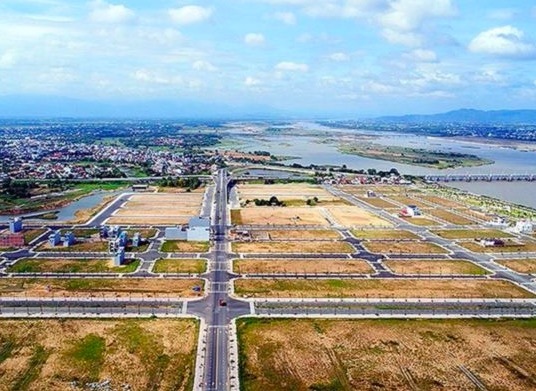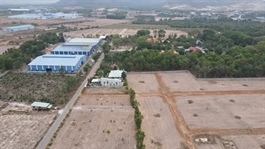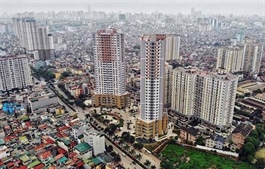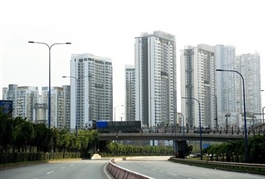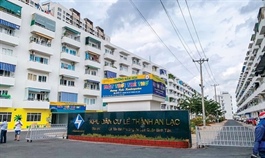Players display positivity for real estate
Players display positivity for real estate
A range of amendments to laws on housing, real estate, and land is expected to make the market more stable.

A slowdown of the domestic economy and the tightening of credit policies has hindered real estate in Vietnam in recent times, but Nicolas Michaux, founder of Alpha Prime in Hong Kong, is quietly optimistic over near-term prospects.
“The market witnessed a decline in both supply and demand, as well as a drop in prices and rents across most segments. However, the market is expected to recover in 2024 and accelerate in 2025, thanks to the government’s efforts to stimulate the economy, improve the legal framework, and draw in foreign investment,” Michaux said.
He added that one of the key factors that would boost the market was the enactment of new laws on real estate business, housing, and land.
“These laws, which will take effect from 2025, aim to provide more clarity, transparency, and consistency in the regulations governing the real estate market, as well as to protect the rights and interests of both developers and buyers,” he added.
Some of the notable changes introduced by these laws include expanding the range of property types and real estate products that can be traded, such as mixed-use works, separate floor areas, and land use rights with technical infrastructure.
Clarifying the requirements and conditions for different types of investors in the real estate market is another outperforming issue, such as domestic and foreign individuals and organisations, and exempting some foreign-owned enterprises from the investment procedures applicable to foreign investors.
In addition, regulating the sale and purchase of land use rights, requiring the land to have existing technical infrastructure, prohibiting the sale of bare land areas, and setting out the eligibility and conditions to transfer a real estate project will all be fresh features.
“These new laws are expected to create a more competitive environment, as well as enhance the quality and efficiency of real estate projects. The sentiment from foreign investors in general for the market in 2024 is likely to be positive, as they will benefit from the improved legal framework,” Michaux added.
Meanwhile Can Van Luc, member of the National Financial and Monetary Policy Advisory Council, is optimistic that the market this year will perform positively compared to the previous two years, and will be the foundation for opportunities for growth of the market in the next period.
“With new policy mechanisms being adopted and policy penetration also starting to become clearer, the real estate market will certainly have positive changes,” Luc said.
The stance stems from factors that are considered to have a positive impact on the market’s ability to recover, according to Luc. The economy in 2024 is forecast to grow more positively; interest rates are on a downward trend; aforementioned new laws have all been approved; capital sources for the market will be more abundant; and the bond market has recorded a recent increase in issuance volume.
According to the Vietnam Association of Realtors (VNAR), the adoption of the amended Law on Land (LoL) is an important turning point, expected to revive the real estate market, resolve legal issues, create better conditions for investors, and contribute to the development of the real estate market in a transparent and sustainable direction.
“The new regulations in the new law have a basis to apply in practice and change the market. For now, the LoL 2024 will contribute to increasing confidence and helping homebuyers feel more secure to return to real estate,” said Van Binh, deputy chairman and general secretary of the VNAR.
However, Dinh Minh Tuan, a director of Batdongsan.vn, said that the amended land law should not be expected to help the market to recover quickly.
“I think we need 8-12 months for the law to be absorbed and implemented. That is also the reason why it was passed so early, so that over the next year, market participants can discuss, understand, and prepare,” Tuan said.
Hoang Huu Minh Dung, head of Research and Development at BHS Group, said that housing demand, especially in Hanoi and Ho Chi Minh City, remained high.
“While waiting for the new law to be promulgated, it is difficult for projects to be approved for sale, so the supply of new residential real estate is still limited. The projects that will be open for sale are mostly old projects,” Dung said.
Statistics from BHS Group said that in 2024, about 183,000 high-rise apartments in the both cities would be open for sale. Another 70,000 low rise housing units will be opened to the market this year, mostly in Haiphong, Hung Yen, and Hanoi in the north. In the south, Long An and Dong Nai are leading the market, followed by Ho Chi Minh City.
“Thus, the real estate market will still have a chance to recover in 2024. However, the signs of a full recovery will be most clearly shown in 2025, when the amended laws come into practice,” Dung said.






